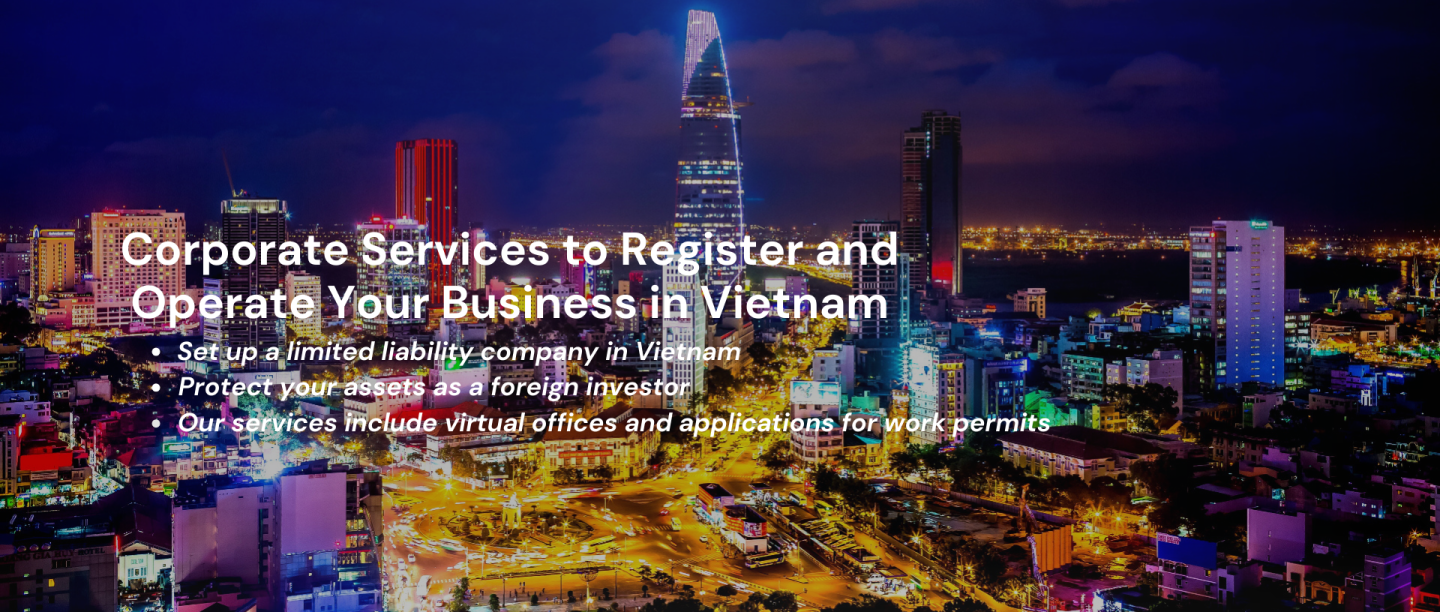I. Overview of the Wholesale and Retail Industry in Vietnam
Vietnam’s wholesale industry is experiencing significant growth, driven by rising consumer demand and an expanding retail market. In 2023, the retail sales of goods in Vietnam reached approximately 4,859 trillion VND, reflecting an 8.6% increase from the previous year. This upward trend presents substantial opportunities for businesses to diversify and innovate.
Currently, the most common business structure for a wholesale and retail business in Vietnam is a Limited Liability Company (LLC). An LLC allows 100% foreign ownership and provides liability protection for its members. Furthermore, this business structure provides lower tax rates, increasing profitability for retailers, in addition to low initial set-up costs.
As for the most common business setups for the wholesale and retail industry in Vietnam, the market has a preference for:
• Retail Storefronts (Supermarkets, Department Stores, Specialty Stores)
• E-Commerce Marketplaces
• Dropshipping Businesses (Wholesale Outlets, Distribution Centers)
• Omnichannel Retail (Combination of both online and offline stores)
II. Key Requirements for Setting Up A Wholesale and Retail Business in Vietnam
1. Wholesale Business Requirements
In Vietnam, a business is considered wholesale when it sells goods in large quantities to retailers, businesses, or other commercial entities instead of directly to individual consumers. These are generally considered B2B entities.
Below are the essential requirements and regulations for establishing a wholesale business:
• Investment Registration Certificate (IRC) from the Department of Planning and Investment
• Enterprise Registration Certificate (ERC) or Business Registration Certificate (BRC) Both these licenses double as sufficient licenses for engaging in wholesale business activities
• Appoint a legal representative
• An official business address
• The proposed capital investment should align with planned expenses and your business activities.
2. Retail Business Requirements
Retail refers to the sale of goods and services directly to consumers (B2C) for personal use, typically in smaller quantities. The following are the key requirements and regulations for operating a retail business, ensuring compliance with local laws and market standards:
• Investment Registration Certificate (IRC) from the Department of Planning and Investment
• Enterprise Registration Certificate (ERC) or Business Registration Certificate (BRC)
• Retail Sale License from the Department of Industry and Trade (MOIT)
• Business License for retail distribution activities
• Retail Outlet Establishment License (required for each retail outlet location)
• Appoint a legal representative
• A financial plan for running a retail business
• Demonstrate financial capacity and explain funding sources
• No overdue tax liability if established in Vietnam for over a year
• Retail outlet locations must comply with relevant local planning regulations
In addition to these requirements, companies must go through an Economic Needs Test (ENT). The ENT is necessary for retail outlets beyond their first retail store if they are:
• 500sqm or larger
• Not located in a shopping mall
• Not classified as a convenience store or mini supermarket
However, foreign investors from countries within the Comprehensive and Progressive Agreement for Trans-Pacific Partnership (CPTPP) are exempt from going through the ENT, making it easier to start their retail business in Vietnam. These countries include Singapore, Australia, Canada, Japan, Malaysia, Chile, and more.
III. Import Regulations for A Wholesale and Retail Business in Vietnam
When importing products into Vietnam, the most important step is obtaining an import license. There are two types of import licenses in the country, depending on your products:
• Automatic Import License: For goods posing minimal risk
• Non-Automatic Import License: For goods that require closer inspection by authorities
For wholesale businesses, the IRC and ERC/BRC are enough, and no trading licenses are necessary for importing products. However, retail businesses will require a Trading License from MOIT which takes around 6 to 12 weeks to process. This Trading License is necessary for imports and distribution activities as it specifies intended retail activities and products.
IV. Product Registration for Regulated Goods in Vietnam
Additionally, certain products require registration with Vietnamese authorities before importation. These include food and beverages, cosmetics, medical devices, and pharmaceuticals. As for import taxes, you should keep the following in mind:
• Import Duty
• Value-Added Tax (VAT)
• Special Consumption Tax (SCT) for certain products
• Environmental Protection Tax (EPT) where applicable
Furthermore, the following documents are required for importing your products into Vietnam:
• Commercial Invoice
• Packing List
• Bill of Lading / Airway Bill
• Certificate of Origin
• IRC and ERC / BRC
• Conformity Certificate (if applicable)
• Inspection Certificate (if applicable)
V. Steps to Register Wholesale and Retail Business in Vietnam
Registering a wholesale and retail business in Vietnam involves a series of steps that can vary depending on your business structure. The process can differ depending on whether you’re planning a physical retail store or an online retail operation. Below you’ll find the key steps for setting up a wholesale or retail business in Vietnam:
1. Establish A Company: Setting up a Limited Liability Company is a crucial first step for setting up a wholesale and retail business in Vietnam. During this process, companies will obtain the IRC and ERC from the Department of Investment and Planning which are essential for operations.
2. Open A Company Bank Account: A corporate bank account is necessary to deposit the business’s capital as evidence which is important as part of the requirements during registration.
3. Obtain Operational Licenses and Appoint Representative: Operational-specific licenses need to be applied for at the offices of their respective governing bodies and a local representative must be appointed.
4. Establish an E-Commerce Platform: Businesses venturing into e-commerce must register with the Ministry of Industry and Trade (MOIT) and obtain an E-Commerce Business License. If the business criteria are met, a representative office must be set up, and e-commerce platforms must comply with the Law on E-Transactions and Law on Protection of Consumer’s Rights.
VI. Register Products
Certain products will require additional licensing and approvals from local governing bodies. This includes those under the food and beverage, health supplements, and medical device categories.


